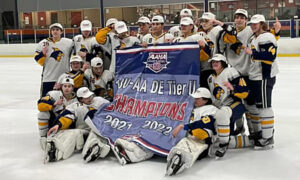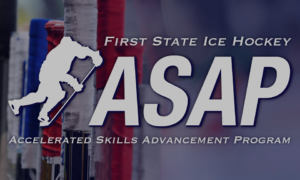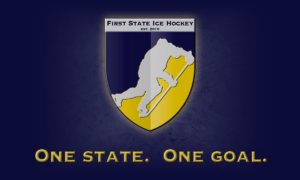Sean Cannon fell in love with hockey at a young age in his native New York. Now, as the hockey director at the Patriot Ice Center in Newark, Del., Cannon is determined to spread that love of the game with Delaware’s next generation of hockey players.
Cannon, who at age 6 moved from his native Middletown, N.Y. to the upstate village of Canton, comes from a hockey family. His brother Steve is active as a USA Hockey on-ice official, and his sister Erin played for Providence College from 1997 to 2001. As such, hockey has long been in his blood. Sean recounted his early immersion in Appleton Arena and Walker Arena — the game’s hallowed halls in the northernmost reaches of the Empire State:
“We had St. Lawrence University in our home town and Clarkson’s 10 minutes down the road. When you grow up watching those guys every Friday and Saturday night in the winter, and you’re in a town of 7,000 people and the building holds 4,000 — and it’s sold out every night — it’s ingrained into you. Hockey is life up there. Every kid in our town aspired to be those guys; they wanted to be the college hockey players.”
Those childhood aspirations led to Cannon playing in goal for his high school team, the Canton Golden Bears, for four years under veteran coach Randy Brown, who amassed over 350 wins and four state championships — Cannon part of the 1997 and 1998 championship teams as a back-up behind an all-state netminder — in a 24-season scholastic career.
“I learned from him how to push yourself to be better than you thought you ever could be,” Cannon said of his time playing under Brown’s guidance. “He was the first coach to push me to that level. To watch him push not just me but 20 other guys to a level that was pretty amazing for three years, you get—’Wow, that’s fun! I wish I could do something like that for a living.'”
Now, two decades later, the 38-year-old Cannon is doing just that.
After serving in a supporting role — “the skills goalie in practice, stuff like that,” with the SUNY Canton National Junior College Athletic Association program, he gained coaching experience with the Delaware Stars youth program in Harrington, Del., American Collegiate Hockey Association teams in Pennsylvania and Iowa, a pair of Eastern Hockey League programs, and most recently a four-year stint with the Valley Forge Minutemen, based in Oaks, Pa.

“I think there was a total of eight to 10 kids who went on to play either NAHL or Division 1 or Division 3 — pretty good numbers from a small sample,” recalled Cannon of his tenure with the Minutemen, who play in the competitive Atlantic Youth Hockey League.
Having coached collegiate, junior and high-level youth hockey, Cannon has no doubt seen his share of talented players. But his passion to grow the game extends to every player who sets foot on the ice, and he feels the time is now to raise the bar in the First State.
“Delaware hockey means something to me, now that my family has lived in Delaware since 2003,” said Cannon. “My brother referees and does all the stuff he can with hockey. I just think it’s time for Delaware hockey to take the next step, and I’m hoping with my experience that I can take what I’ve learned, bring it back here, and say, ‘Let’s build the best players we can build,’ and not just the kids who are going to go play in the NHL. Let’s also work with the kids who are going to play ACHA and realize that’s going to be their path, or the kids who just want to play high school. We want to make every kid better and the game better itself, not just individuals and not just certain clubs.”
Cannon’s mission, one of inclusion and player development, vehemently rejects the “win at all costs” approach that enables a handful of talented players to carry teams to the playoffs, but with major consequences — less playing time and skill development in the short term, and the potential for interest and involvement in hockey to tail off in the long term.

“I believe that a coach’s goal should be to take every kid they have on their team and make them better,” affirmed Cannon. “As long as every kid has gotten better, you’ve done your job. Wins and losses will take care of themselves.
“Kids need to feel adversity; they need to fail in order to learn,” he continued. “If you win and you win the wrong way, you’re going to continue to win the wrong way. But if you fail, you’re going to figure out how to do things the right way. Those are teaching moments. Not yelling moments, not moments to get kids to quit. Those are chances for adults to step in and say ‘You made a mistake. This is a game of mistakes — it’s okay; let’s learn from it.'”
Additionally, Cannon feels strongly that everyone who laces up skates and picks up a stick has a positive experience, opportunities to learn and develop as players — whether they’re the star centre on a AA team or a fourth-line winger on a B squad, and a path to enjoy the game at the level to which they aspire. To achieve this, Cannon stresses an importance of teamwork off the ice between families — and even between rival clubs on the ice — to best serve the interests of the players.
“The first thing I want to see is numbers up — more and more kids playing,” Cannon said. “And the only way that’s going to work is if all the organizations work together. Everyone’s got to put down their egos, and we need to come together and figure out what’s best for the kids.
“Everyone should be able to enjoy the game at the level they want to enjoy it. Some people want to be more competitive, some people don’t. We want every kid to get better and every kid to play more. If a kid wants to go as far as he can take it, hopefully we have an avenue for that kid here. If a kid just wants to not get smoked at the blue line and play, we have an option for that kid. If we’re all working together and helping these kids find places that they can continue to play — we want to keep them in the game at the level they want to play. Within 10 years, hopefully we have paths for every player.”
Quick to remind that Rome — Italy or New York — wasn’t built in a day, Cannon is in it for the long haul . . . not just to grow hockey at the Patriot Ice Center, but to help foster the next generation of a growing hockey culture throughout the First State.
“The patience has to be there — it won’t happen overnight. The growth in Delaware is going to happen; I’m really excited to be here.”














